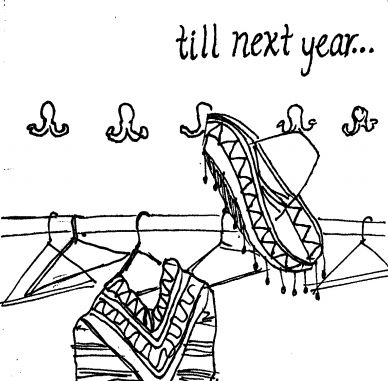
With Halloween upon us, it’s important to remember the roots of the tradition and how it came to be. What started as the ancient Celtic festival of Samhain, where people would light bonfires and wear costumes to ward off ghosts, has transitioned into a fun day for people to get dressed up and pretend to be someone or something they’re not.
There are no other costume-oriented holidays in the Gregorian calendar, so this is the one chance for everyone to rack their brains and decide on a fun costume to wear. However, somewhere in the world every Halloween night, there’s a white person taking a picture in a costume that will prevent them from getting elected for office one day. This is due to the plethora of popular costumes that are appropriating cultures.
Cultural appropriation is defined as “the act of adopting elements of an outside, often minority culture, including knowledge, practices and symbols, without understanding or respecting the original culture and context.” This act stereotypes and inaccurately represents entire groups of people, particularly marginalized groups. People who appropriate cultures often do so in an offensive way, with racist undertones supporting their actions.
Some costumes that depict cultural appropriation include Geisha costumes, Men’s Arab Sheik costumes, traditional Native American costumes, “Gypsy” costumes, Mexican male costumes with ponchos and sombreros and anything involving blackface. All of these costumes inappropriately represent marginalized groups in a way that dehumanizes and humiliates them.
The very premise of being able to “put on” a caricature of something that a particular group of people cannot control, and are oppressed for, is a privilege white people have that they must recognize before dressing up on this holiday.
We at The New Paltz Oracle condemn and advise against wearing costumes that appropriate culture. While this message may seem simple, it’s one that has to be driven home every year around this time; it’s not beating a dead horse if the horse in question is still alive and well.
If you read this editorial and question why we, a newspaper organization, are trying to police what you wear during Halloween, we implore you to look beyond that initial reaction. Rather, we want to pose some questions: Why do you feel specifically targeted by this? Why would you want to wear a costume that could potentially offend or promote negative stereotypes against a group of people?
There are, of course, other costumes that don’t necessarily fall into the category of cultural appropriation, but are still problematic and disrespectful. For example, pregnant nun costumes undermine a valued part of Catholicism, while transphobic costumes such as the Caitlyn Jenner costume sold on Amazon last year obviously seek to delegitamize the transgender community.
Halloween, for most adults, is the one night a year to indulge in your childhood desires to dress up as someone, or something, else. Other childhood behaviors, such as not knowing the difference between right and wrong, should not be a factor in the holiday.
While it is completely warranted to bring attention to costumes that could be considered offensive, like those aforementioned, it is also important to remember to refrain from policing others’ costumes, especially those worn by women.
Aside from offensive costumes, slut shaming also has no place in the holiday. “Sexy” costumes have been a part of American Halloween culture for decades. The trend, ironically, is one that most likely came to be due to the male gaze. However, it is common for men to shame women for these costumes.
We believe that women can and should wear whatever they want on Halloween (aside from the aforementioned culturally offensive costumes), just like any other day. Just because it’s Halloween doesn’t mean misogyny can fly; women, like everyone, should be able to enjoy the holiday without fear. Consent still exists on Halloween.
Halloween should be a night to play the role of whatever or whoever you want to. If your costume has the potential to offend even an individual, use common sense, be respectful, and make a change.
